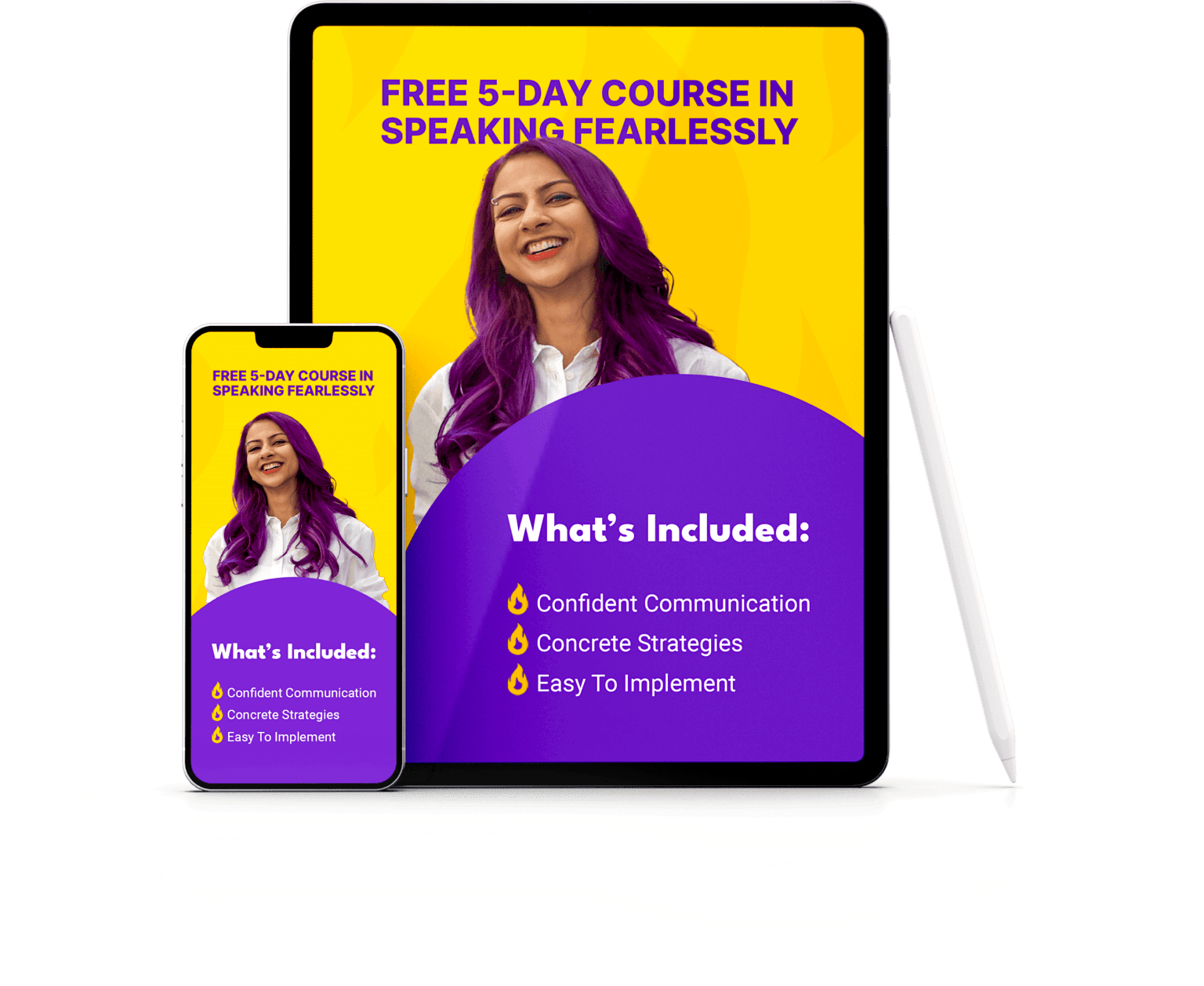You have to deliver that big presentation. Go on camera for that podcast. Give that talk.
But you feel absolute dread. Stage fright is real and it can feel crippling. What’s worse – it can stop you from saying yes to opportunities to speak in front of an audience.
Which means it can stop you from becoming more visible, growing in your career and your business.
The good news is you can absolutely overcome stage fright.
In this blog post I have a step by step guide to turning you into a more confident speaker. I have broken down your pathway to conquering your stage fright in 8 steps.
Read on to discover EXACTLY how to make sure you never feel that dread before going on stage again.
What’s inside this article

1. Understanding stage fright and fear of public speaking
When you’re about to go on stage or on camera or even just speak in front of a board room of colleagues and executives, your heart starts beating faster.
You’re out of breath and clammy.
You start speaking too fast.
And worst of all – you feel out of control and helpless.
This is because you’re under great stress and experiencing a fight or flight response. You’re confronted with a situation that you’re extremely uncomfortable in. You either want to run away and hide or you’re aggressively fighting it out in your head, distracting you from getting your point across.
Neither response is ideal. One makes you shrink and mumble and the other gets you speaking too fast in an effort to defeat the nerves.

The real reason why you’re feeling this level of stress is because you feel out of your depth. People feel fear of the stage for many different reasons:
Fear of forgetting your words.
Fear of embarrassment.
Fear of disappointing others or yourself.
Dive a bit deeper and you’ll see how these fears are linked to your beliefs about being on stage:
Perhaps you had a traumatic experience on stage earlier on in life which still haunts you.
Perhaps you haven’t been on stage since you presented at school.
Or perhaps you’ve built your reputation as an expert and don’t want to ruin it.
Taking the time to understand the source of your fear and anxiety is the best way to overcome stage fright. It gives you back control over your fear of public speaking.
When you have achieved this, you will be able to create an intentional positive feedback loop. But before we get to that, step 2.
In this video, I talk about overcoming stage fright through my out-in-out strategy.
Get full video transcript here.
2. Reframing public speaking:
Think about what you consider to be public speaking opportunities. Most likely, you’re only considering big presentations, talks or podcasts. But you’re speaking in public way more often than that. You’re speaking in public every time you talk to a group of friends. Or every time you address a group of people on Zoom.
By reframing every single opportunity you get to speak to a group of people as “public speaking”, you’re giving yourself a lot more opportunities to practice your speaking skills.
Bonus: you also make “public speaking” a lot less scary if you make every speaking opportunity a public speaking opportunity.
3. Creating a positive feedback loop

Create an intentional feedback loop by carrying out specific actions, developing self-talk and working on your mindset before, during and after each speaking opportunity.
The idea here is to carry out a series of steps that get you best prepared and in the zone before a talk or podcast. Then create self-awareness and mindfulness while you’re in the spotlight. Debrief with yourself after each speaking opportunity. And finally, close the feedback loop by knowing what you’re strong in and what you can improve on before the next opportunity.
The best time to start creating a positive feedback loop is way before you need to be on stage or on camera.
4. Preparation: 1-2 weeks before your talk or podcast
Use a three-fold approach to arm yourself with preparation, courage and strategic practice before you go on stage.
A strong speaking skillset:
First, prepare yourself by understanding the basics of strong speaking. This way you’ll never feel underprepared – and more so, you can respond to that negative voice in your head that says you don’t know what you’re doing: “I absolutely do know what I’m doing because I know how to be a good speaker”.
Strong speaking skills include amping up your energy, being in control of your body language and knowing how to use your voice to your advantage.
Mindset:
In conjunction with preparing yourself through improving your skill set, target the fears that you identified earlier head on.
If you fear being judged, remind yourself that the audience is on your side. It’s actually in their best interest if you do well – because it would have been a great use of their time to have attended your session or listened to your podcast.

Strategic Practice:
The biggest lie you’ve been told about public speaking is that practice makes perfect.
This is simply not true.
Practice can only make perfect if it’s done strategically and with feedback.
Strategic practice means that you set a goal for yourself for each practice session: e.g. this time I’ll insert more energy, or I’ll enunciate better.
You’ll only know how to set yourself these goals if you get feedback on your practice sessions – this can be in the form of external feedback (by a coach) or you can even learn how to give yourself feedback.
5. Pre-game routine: the hour before your talk

Develop a strong warmup routine before you need to step on stage or go on camera. There are a number of activities you can choose from:
- Breathing exercises
- Physical warmups like stretches, bouncing in place, dancing
- Listen to your favorite song or podcast
- Warm up your emotions and expressions
- Relaxation exercises, having a favorite drink or going for a walk
I’d suggest you try out different routines to see which ones bring you the most energy, the best vibe and get you in the zone the fastest.
6. Creating self-awareness in the spotlight

When I ask a beginner what being on stage was like, they often say: “I don’t know. I don’t remember much”.
This is because they were in fight or flight mode. Their main objective while they were in the spotlight was either to fight in desperation or get out as soon as possible. Neither feeling is conducive to being aware of what’s happening in the moment.
But when you’re unaware of what’s going on in the moment, you’re not relaxed. You’re not in control. And you’re definitely not portraying confidence.
Instead, cultivate a sense of self-awareness and mindfulness when you’re in the spotlight. Stay in your body. Stay grounded. Observe the audience. Breathe and pause. And make sure you’re exposing yourself to “performing in the spotlight” by seeking out lower-stakes opportunities to speak at regularly.
7. After your talk
This is the part that most speakers skip.
And that’s exactly why some speakers remain fearful and nervous each time they speak in public, despite gaining experience.
The most crucial thing to do after your talk is to take a moment to debrief with yourself.
What did you do well?
What can you improve?
Both answers are equally important.
You have to understand what you did well so that you know how you can become exceptional at what you’re already good at.
And having an awareness of what you’re doing well helps the next time you face the imposter syndrome when you need to speak.
It’s great to know what you can improve on – so that you know how to set goals for your next practice.
8. Closing the positive feedback loop
Now that you have a healthy routine for what to do before, during and after your speaking opportunity, close this positive feedback loop.
The next time you’re speaking, make sure you look back at your previous speaking opportunities to remind yourself of
a) What you’ve done well, so that you know you can do it again.
b) The one thing you want to improve on next time.
This will give you a clear goal for the new opportunity and prevent you from being too overwhelmed with needing to nail everything at the same time.

Now you have a robust 8-step process to target your stage fright. The best time to start working on getting rid of your stage fright is right now: don’t wait till you land that talk or get asked to make that big presentation.
If you want to work with an amazing coach who can guide you through this process of overcoming your stage fright, might I recommend myself? Find out how you can work with me and take advantage of my 10,000+ hours on stage and on camera to become a better speaker.



